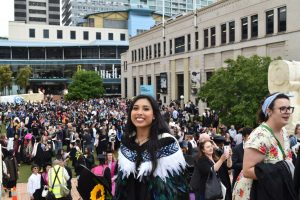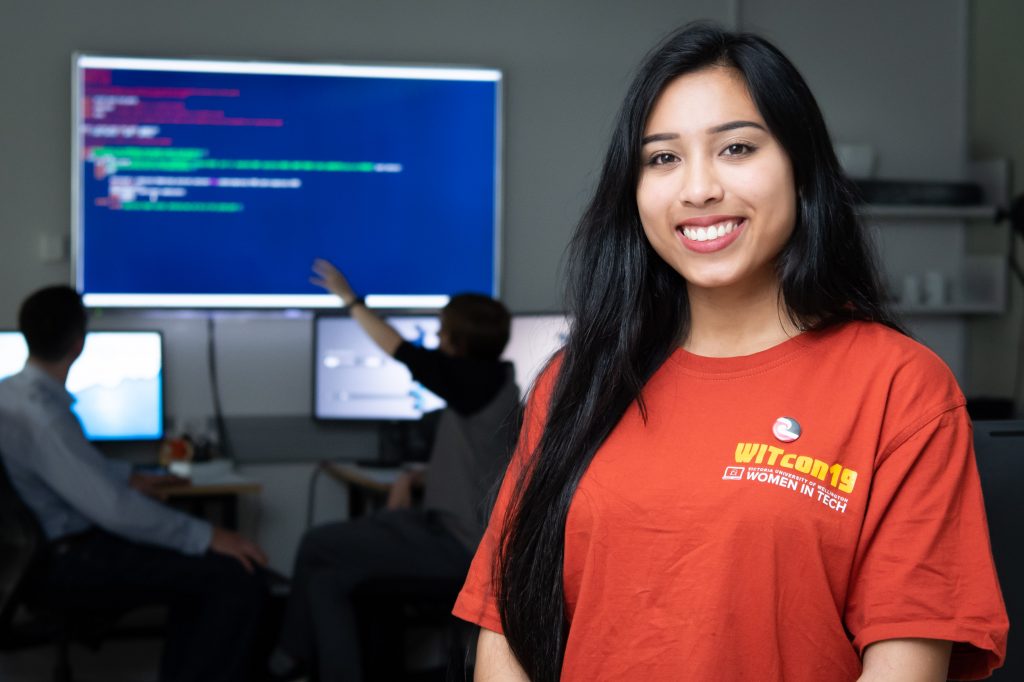“There are real-world consequences for a tech industry lacking diversity.”
In 2020, Aleisha Amohia was named one of 25 young New Zealand women changing the world. She tells us why she is a passionate advocate for diversity and inclusion in the technology industry
WHO OR WHAT INSPIRED YOU TO STUDY COMPUTER SCIENCE AND AI?
I was one of the lucky ones who knew from a very young age that I wanted to work in technology, but there were a few key reasons that I ended up studying computer science.
Firstly, I grew up in a household that valued education, so I knew I wanted to go to university and widen my career options by getting a qualification, even though I was aware of other pathways into the tech industry.
Secondly, my favourite subject at school was Digital Technologies. I enjoyed my programming assignments and was proud of what I could create. I also had two awesome teachers who flew us from Wellington in New Zealand to Silicon Valley and Seattle in the US to show us what working in the tech industry could look like, and introduce us to other women who had made tech their careers.
Finally, I was able to get a taste of working in the tech industry, specifically in an open source project team, before I started studying. This experience taught me that I definitely wanted to do more in the tech industry, but that I still had plenty of learning and growing to do. I chose computer science and AI because I wanted to be prepared, and gain all the tools I needed to do the work I wanted to do – but I also thought it sounded cool!
WHY DID YOU STUDY MANAGEMENT AND INFORMATION SYSTEMS ALONGSIDE COMPUTER SCIENCE AND AI?
Growing up, I was super aware of the stereotypes surrounding people who worked in technology – socially awkward, bad at communicating, and often carrying negative attitudes toward people or concepts they disagree with or don’t understand.
I also found myself feeling that sometimes the tech industry gets caught up in making things as cool, fast or impressive as possible, and I don’t necessarily agree that this is the best way to ensure we’re building things to genuinely improve people’s lives. Therefore, I chose to study commerce alongside computing, so that I could also study people. I wanted to learn how to communicate with those who disagreed with me, and with the people who made the big decisions about how technology is used and developed.
WHY DO YOU LOVE STUDYING AND WORKING IN TECH?
Studying and working in tech has allowed me to draw on all the different parts of myself – I can be creative and logical, work on my own and with others, write code and write articles, get lost in a solo project and speak publicly at events, teach others and continue to learn myself. I love to challenge myself, build and fix things, and know that the work I’m doing is going to make someone’s job or life easier.
I also work in open source software, which is even more special because it is ‘by the people, for the people’. I work on an open source library system called Koha which is used by over 18,000 libraries worldwide and completely community-driven. Nothing goes into the software without others in the community testing and approving it, and we get feedback directly from people who will actually use Koha (library users and staff). This is an example of how technology is only as strong as the community contributing to it. Koha is a powerful, global project because it is a product of the people, of which I am very proud to be part.
HOW DID YOU BECOME PRESIDENT OF VICTORIA UNIVERSITY OF WELLINGTON WOMEN IN TECH?
Victoria University of Wellington Women in Tech (VUWWIT) was originally a group of engineering students who organised casual meet-ups. I joined the committee in my second year and since most of the original members were graduating at the end of the year, I realised I had to take action to make sure VUWWIT didn’t leave with them. That action involved formally registering VUWWIT as a club with the university (which made us eligible for free venue hire on campus and funding applications), putting together a constitution, and getting members signed up. I was the first official President of VUWWIT for two years until I finished university.
WHAT DID YOU GAIN FROM YOUR EXPERIENCE AS VUWWIT PRESIDENT?
Being involved with VUWWIT was significant. As a Māori-Asian woman studying male-dominated subjects, the overwhelming culture of toxic masculinity and lack of support for women (which is common in the tech industry and certainly not unique to the university) left me feeling isolated, stressed and incapable. I knew I couldn’t be the only person feeling this way, so I ventured out to find a community of people who advocated for (or needed) a more diverse, inclusive tech industry, just like me. Too many women leave engineering and computer science courses, so I wanted to give my energy to creating a space that made people like us feel safe and validated.
IS THIS WHY YOU ARE A PASSIONATE ADVOCATE FOR DIVERSITY AND INCLUSION?
The tech industry has been my focus because, naturally, I want the spaces that my colleagues and I exist in to be welcoming and safe for us. Most of the people who work close to me are young, or Māori, or women, or disabled, or a combination of identities, and the tech industry is not always designed to support or enable us to be our best.
There are also real-world consequences for a tech industry lacking diversity. The products and services around us are all powered by tech or have technological aspects – tech touches everything. It can cause problems and possibly become dangerous if engineers and developers neglect to consider and include the needs and experiences of all potential users into their tech solutions.
HOW DID YOU BECOME INVOLVED WITH THE MĀORI DESIGN GROUP AT INTERNETNZ?
A few friends recommended me for the position, and I agreed because it is an opportunity to work with an organisation that is willing to invest in implementing some real structural and cultural change to honour Te Tiriti o Waitangi [the Treaty of Waitangi] in their work. I’m also beyond excited to be working with an inspirational team who are experts in their respective fields, and I have already learned a great deal from them.
DO YOU FEEL THAT YOU ARE FULFILLING YOUR DREAMS AS A SOFTWARE DEVELOPER AT CATALYST IT?
Catalyst has been awesome. They employed me after I was a student in the Catalyst Open Source Academy in 2014 – first as an intern, then in a permanent part-time role while I was at university, and now full-time since graduating. I’m pleased to say this is exactly what I wanted to do after graduating. Catalyst allows me to explore all my interests, from programming to politics, and supported me with a scholarship while I studied, which went above and beyond what I had imagined.
WHAT DO YOU IMAGINE FOR YOURSELF IN THE FUTURE?
I’d love to find an intersect between my political and technological interests. Catalyst has allowed me to have a flexible schedule and make time for all of my commitments, which shows how much they value diversity and inclusion initiatives. In an ideal world, in the future, we’d all be able to simply do the work we enjoy without also needing to advocate for ourselves and other people from marginalised groups. Until we achieve that, I imagine myself still working on tech solutions that continue to centre people.
WHAT CHALLENGES HAVE YOU HAD TO OVERCOME TO GET TO WHERE YOU ARE TODAY?
Most of the challenges I’ve faced have been a result of working in a male-dominated industry and in a colonised country. I find myself being questioned and challenged on things that are not only blatantly obvious to me but have also been thoroughly confirmed by research and evidence.
For example, I’m always asked to explain why we need groups like VUWWIT and whether gender inequity is still a problem. I’m told that women are simply not choosing careers in tech and that’s why we are in the minority. I’m invited to promotional photoshoots because my identity is marketable. I’m told that Te Reo Māori is a dying language and that I’m always going to be fine in my career because companies will hire me to fill their diversity quotas.
HOW DO YOU OVERCOME THESE CHALLENGES?
I have learned to overcome this ignorance (usually accompanied by tokenism, racism, ableism and misogyny) by choosing my battles. I’ve learned to establish who has a genuine interest to learn and engage, and who is searching for an opportunity to assert their own opinions. As much as possible, I’ll direct people to articles or resources where they can get information in their own time, from people who have already done the work to share with them. That way, I can preserve my energy for the initiatives that I’ve actually signed up for, rather than spending it on emotional and unpaid labour.
HOW DID IT FEEL TO BE NAMED ONE OF 25 YOUNG NEW ZEALAND WOMEN CHANGING THE WORLD?
It was an absolute honour to be included in the Y25 2020 list, alongside a group of women who are doing incredible things and are a massive inspiration for me. I feel like, together, we are changing the balance. There are more people willing to have uncomfortable conversations that will change the world – and they have to be uncomfortable otherwise there will never be change. There’s still plenty of work to do but there’s more of us doing it now.
DO YOU FEEL LIKE YOU ARE CHANGING THE WORLD?
I like to think I’m contributing to a movement that started long before me, and I hope that I’ve helped a few young women with their own journeys into tech and other male-dominated areas.
IF THERE IS ONE THING YOUNG PEOPLE SHOULD KEEP IN MIND, WHAT DO YOU THINK THAT SHOULD BE?
Don’t be afraid to challenge the system, and surround yourself with people who remind you of who you are.
ABOUT ALEISHA

Aleisha has always had a strong interest in technology. At school, she was the technology prefect, ran the school technology club, and completed the Catalyst Open Source Academy when she was 15 years old.
Aleisha graduated from Victoria University Wellington in New Zealand with a BSc in Computer Science & Artificial Intelligence and a BCom in Management & Information Systems. She is currently Koha Development Lead at Catalyst IT, Co-Chair of Māori Design Group at InternetNZ, YWCA Greater Wellington Board Member, Wellington Alliance Against Sexual Violence Board Member, and Co-President of the National Council of Women New Zealand (Wellington).


